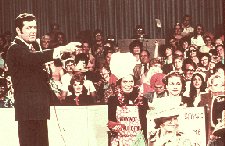Let’s Make
A Deal premiered on the NBC daytime lineup in December 1963, and first moved
to nighttime in 1967. the basic format had Emcee Monty Hall open the show by
choosing contestants from among members of the studio audience – who came
dressed up in outrageous costumes to attract his attention. The contestants
chosen could trade something that they had brought with them for a prize. They
then had the opportunity to trade this first modest prize for objects hidden in
boxes or behind curtains on the stage.
The hidden
prizes could be trips, money, expensive jewelry or other valuable merchandise –
or they could be "zonks," worthless nonsense prizes. Most of the contestants
were offered multiple options to test their greed in “trading” what they had
already won for something possibly more expensive – or possibly a "zonk". At the
end of the show the "Big Deal of the Day" gave two of the biggest winners the
chance to trade their loot for whatever was behind one of three curtains.
Although there was rarely a "zonk" at this point, a big winner could end up
trading his current prizes for something worth much less.
In addition
to its 13-year daytime run (1963-1968 on NBC, 1968-1976 on ABC), Let’s Make A
Deal appeared in prime time as a summer-replacement series in 1967 and as a
regular series from 1969 to 1971. There was also a syndicated evening series
from 1971 to 1976, a Vancouver-based revival in 1980, and another revival that
premiered in the fall of 1984 and ran for two seasons. When Let's Make A Deal
returned to the NBC daytime lineup in July of 1990, originating from the
Disney/MGM Studios Theme Park in Orlando, Florida, there was one major
change: for the first time Monty Hall was not the Emcee. Hall, one of the
creators and producers of Let’s Make A Deal, had given the reins to a
younger man, Bob Hilton. Low ratings prompted Hall to return after a few weeks,
but the series was dropped from the NBC lineup in January 1991.
Yet another
revival aired in prime time on NBC in 2003, produced by Hall and hosted by young
Billy Bush, an entertainment reporter for Access Hollywood and The
Today Show, and nephew of President George W. Bush.










